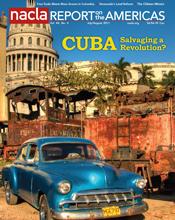Report
The continuing economic crisis in Cuba has not only changed many Cubans’ attitudes toward their lives but has also opened up new cultural spaces for expression.
Reforms proposed at the Sixth Communist Party Congress represent a new, third phase of social policy in post-revolutionary Cuba. This new stage has the potential to strengthen social equity in Cuba, improve the socio-economic situation of disparate social groups, and overcome the old limitations of social policy. Yet it could also increase inequality, and at least in the short term, its predicted impacts will be contradictory and ambivalent.
After significant investment and a slow entry into international markets, Fidel Castro’s “billion dollar gamble” on the home-grown Cuban pharmaceutical industry now seems poised to pay off.
In April, the Sixth Congress of the Communist Party of Cuba approved the most profound reforms that the island had seen since the 1960s. They are meant to revive the flagging economy. But are they sufficient? Will they succeed in reducing the hemorrhaging of state resources and increasing productivity, while enhancing social welfare? What will become of the thousands of laid-off public-sector workers? The jury is still out, and the answers to these questions will depend on the implementation of the reforms themselves.
The Protagonistic Critical Observatory Network
On April 29, the Protagonistic Critical Observatory Network (Red Protagónica Observatorio Crítico), an autonomous group of Cuban activists and intellectuals, received the following invitation via e-mail from the U.S. Interests Section in Havana.
It once appeared as if President Obama were proceeding toward a new Cuba policy. He ended restrictions on Cuban American remittances and family travel to Cuba, as promised. Havana was receptive, but there were dark clouds on the horizon.
In recent years, pro-revolutionary but generally anti-bureaucratic groups have emerged in Cuba. One of the more prominent is the Protagonistic Critical Observatory Network, an alliance of collectives representing a broad spectrum of left-wing political positions—together with artistic endeavors, environmentalism, spirituality, and opposition to gender and racial discrimination.
Despite fragmentary data, several studies have shown that racial inequality has worsened in Cuba since the 1990s. Anti-discrimination policies, at a minimum, seem necessary if the Cuban revolution is to salvage its anti-racist legacy.
In the face of inadequate Cuban state policies of citizen participation, autonomous groups are emerging from society, in hopes of greater citizen empowerment.
In November 2010, a UN vote ignited a public controversy on the island, as Cubans accused government leaders of failing to protect the rights of gay people. The controversy also illuminated the changing role of post-Soviet civic society in creating government policies toward sexual minorities.

